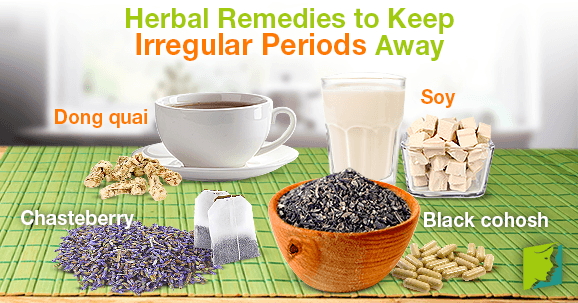Often one of the first menopause symptoms a woman experiences, irregular periods can be frustrating and difficult to adapt to. During perimenopause, irregular periods occur as a result of decreased estrogen production in the body as it prepares to stop menstruation altogether. Sporadic and unpredictable, menstrual irregularities are a nuisance to deal with; luckily, herbal remedies can be helpful in regulating periods and are easy to implement into your diet. Read on to learn more about why irregular periods occur and how herbal remedies are helpful for controlling the symptom.
Why Do Irregular Periods Occur?
The functionality of the menstrual cycle is dictated by hormones, namely estrogen and progesterone. When a woman enters the perimenopausal stage of her life - around the age of 40 - these hormones become imbalanced, which causes increased thickening of the uterus wall lining, and affects the nature and duration of menstrual bleeding. This means that periods are likely to be more sporadic and often heavier than you have been used to in previous adult life. Keep reading to discover the best herbal remedies to regulate your menstrual cycle.
Black cohosh
Black cohosh (Actaea racemosa) has long been valued for its estrogen-like properties that make it prized as an herb for reducing the effect of menopause symptoms. Though it is not recommended to use as a long-term solution to irregular periods (i.e., longer than six months), black cohosh has been found to regulate the menstrual the cycle effectively when consumed as a tea, an herbal supplement, or a tincture.
Chasteberry
Vitex chasteberry (Vitex agnus-castus) can be easily purchased in supplementary or tea bag form from wholesalers, health stores, and online retailers. The herb is popularly used to combat menopause symptoms; it works internally to regulate the secretion of prolactin, a hormone which can cause irregular periods or stop periods from occurring altogether. Chasteberry also boosts the luteinizing hormone (LH) in the body to increase progesterone production, thus rebalancing the progesterone levels that influence the menstrual cycle.
Soy
Soy, or Glycine max, contains phytoestrogens that replace lost estrogen levels in the body. Incorporating soy products such as tofu and soymilk into your diet is therefore likely to help regulate hormonal imbalances and reduce the likelihood of experiencing irregular periods.
Dong quai
Dong quai (Angelica sinensis) is an herb that can be consumed as a tincture, a tea, or in supplementary form, and is celebrated as a go-to herb for minimizing many menopause symptoms, including preventing irregular periods. It has the capacity to open blood vessels plus stimulate and relax the muscles of the uterus to promote regular shedding of the wall lining (i.e., a period).
Recommendation
It is always a good idea to carry sanitary wear, such as tampons or pads, in your handbag so that you are prepared for bleeding to begin unexpectedly, even if you are taking measures to help regulate your periods. Herbal remedies have been a go-to solution to menstruation problems for centuries, and are worth considering before seeking other drastic forms of medical treatment. With the capacity to stimulate an estrogen-like effect, these herbs are affordable, natural, and easily incorporated into your routine.
Sources
- Ehrlich, S.D. (2012). Dong quai. University of Maryland Medical Center. Retrieved January 27, 2014, from http://umm.edu/health/medical/altmed/herb/dong-quai
- National Center for Complementary and Alternative Medicine. (2012). Soy: Science and Safety. Retrieved January 27, 2014, from http://nccam.nih.gov/health/soy/ataglance.htm
- National Health Service UK. (2012). Menopause: five self-help tips. Retrieved January 27, 2014, from http://www.nhs.uk/Livewell/menopause/Pages/Menopauseselfhelp.aspx
- NYU Langone Medical Center. (2013). Chasteberry. Retrieved January 27, 2014, from http://www.med.nyu.edu/content?ChunkIID=21649




